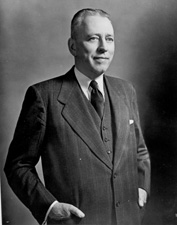Irving McNeil Ives
| Irving Ives | |
|---|---|
 |
|
|
United States Senator from New York |
|
|
In office January 3, 1947 – January 3, 1959 |
|
| Preceded by | James M. Mead |
| Succeeded by | Kenneth Keating |
| Speaker of the New York State Assembly | |
|
In office January 1, 1936 – December 31, 1936 |
|
| Preceded by | Irwin Steingut |
| Succeeded by | Oswald D. Heck |
| Member of the New York State Assembly from Chenango County |
|
|
In office February 11, 1930 – December 31, 1946 |
|
| Preceded by | Bert Lord |
| Succeeded by | Janet Hill Gordon |
| Personal details | |
| Born |
Irving McNeil Ives January 24, 1896 Bainbridge, New York |
| Died | February 24, 1962 (aged 66) Norwich, New York |
| Nationality | American |
| Political party | Republican |
| Spouse(s) |
Elizabeth Skinner (m. 1920–47) Marion Crain (m. 1948–62) |
| Children | George Ives |
| Alma mater | Hamilton College |
| Occupation | Politician, banker, insurance agent |
| Religion | Presbyterian |
Irving McNeil Ives (January 24, 1896 – February 24, 1962) was an American politician. A member of the Republican Party, he served as a United States Senator from New York from 1947 to 1959. He was previously a member of the New York State Assembly for sixteen years, serving as Minority Leader (1935), Speaker (1936), and Majority Leader (1937–1946). A liberal Republican, he was known as a specialist in labor and civil rights legislation.
Irving Ives was born in Bainbridge, New York, to George Albert and Lucie Hough (née Keeler) Ives. His ancestors came from England to the United States, where they settled in Boston, Massachusetts in 1635; they later helped found Quinnipiac Colony in 1638, and lived in Vermont before moving to New York in 1795. His father worked in the coal and feed business. He received his early education at public schools in Bainbridge and Oneonta, graduating from Oneonta High School in 1914.
Ives attended Hamilton College for two years before enlisting in the U.S. Army following the entry of the United States into World War I in 1917. During the war, he served with the American Expeditionary Forces in France and Germany, participating in the Meuse-Argonne and Saint-Mihiel campaigns. He was honorably discharged as a first lieutenant of the Infantry at the war's end in 1919. He then resumed his studies at Hamilton, where he received a Bachelor of Arts degree in 1920 and graduated as a member of the Phi Beta Kappa Society.
...
Wikipedia
